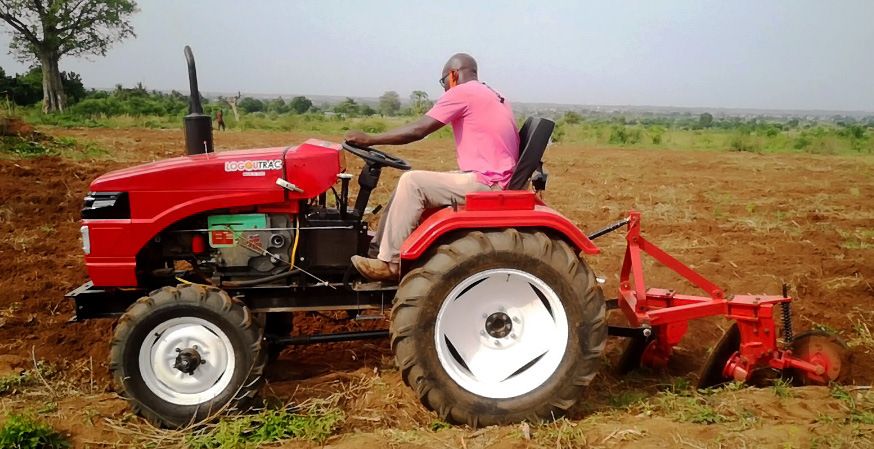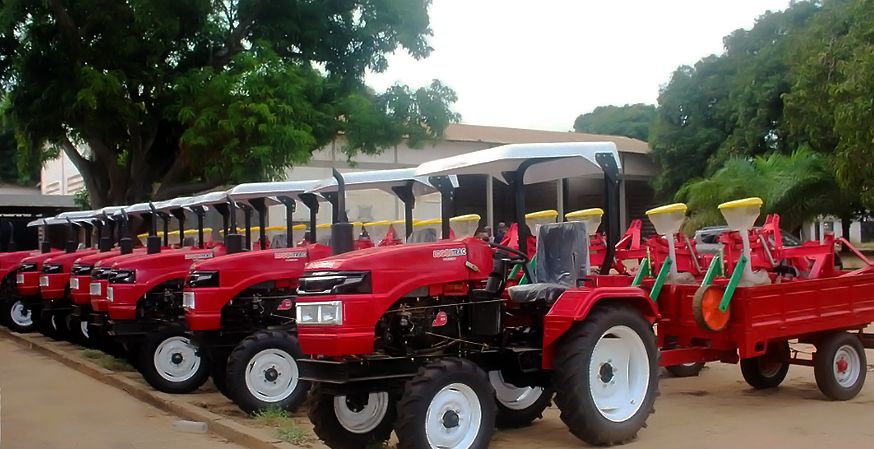Minsob Logou develops $12,000 mini tractors for the West African market

Seeing imported agricultural machinery – often paid for by the government or donors – lying abandoned due to a lack of local servicing or parts motivated Minsob Logou to invest his time, money, and energy into a local solution for farmers. As a result, the Logoutrac mini-tractor was born.
This award-winning Togolese inventor is venturing out of the kitchen and into the field.
Logou, better known in Togo and the region as the “Father of Foufoumix,” needs little introduction to those who follow the world of African invention. Logou was recognized for his work by the World Intellectual Property Organization as early as 2002, and he finished second in the African Innovation Awards in 2014. His desire to create is strong.
“The story began with a lifelong interest in technology that I developed at a young age.” I’ve had a thing for all things technological since the school benches. I need to look at how they were designed, and how we get to the point where what we design can respond to a given functionality. This is what has given me all of this knowledge today, which far outweighs what I learned on the benches,” Logou explained.
Born into a large family, his position as an engineer at Togo Telecom, though coveted, did not prevent the inventor from resigning to devote himself full time to finding solutions.
His first big break came with the invention of the Foufoumix, which allows cooks at home and in restaurants to replace hours of laborious work. The industrial-looking kitchen unit has become so popular in West Africa that knock-offs are now manufactured in China. Logou tries to solve local problems with local solutions.
“The observation of my community serves as the foundation of my research in order to create a product.” “When I see that they are in need of something, I can build machinery to make it easier for them to achieve a result in order to improve performance and make their lives better,” he explained.
That was the thinking behind his latest invention, which was recently launched at his small factory on the outskirts of Togo’s capital, Lomé. Logou describes his “Logoutrac” mini-tractor as a “made-in-Togo mini-tractor, a versatile, powerful, and resilient machine.”
The tractor prototype, which sells for the equivalent of $12,000 in the Philippines, was built with salvaged parts in the hopes of making spare parts more easily accessible to buyers. However, due to high initial demand, the young Togolese engineer quickly moved on.
“I can’t stay in recovery or recycling any longer, so I’m now manufacturing some of these machinery’s spare parts myself,” he explained.
Logou stated that the inspiration for the mini-tractor came from his frustration at seeing large sums of money spent on foreign agricultural machinery only to have it abandoned because spare parts are too difficult or too expensive to obtain locally.
“Most of the time, the solutions we import from elsewhere fail to meet our needs.” As a result, we have issues with agricultural mechanisation. Large tractors do not last long in the field before breaking down. And when they stall, “first, detecting the breakdown is a problem, and the same spare part must be ordered from the parent company, which is quite complicated,” he lamented.

The mini-tractors, which cost 7 million FCFA (approximately $12,000), are designed for both a regional and a local market. That is why Lougou is keeping a close eye on the implementation of the African Continental Free Trade Agreement (AfCFTA), which Togo has signed and which should help him sell his inventions throughout Africa. There are currently trade barriers in place that prevent significant exports.
“People are showing interest, but there has been no international export so far.” We should do it, but the issue is free trade among African countries,” grumbled Logou.
Currently, agricultural groups and the Togolese Ministry of Agriculture sell Logoutrac equipment. A less expensive option is already in the works.
“Because the cost is out of reach for all farmers,” Lougou explained, “we are working on a tiller for those who cannot afford it.”
Logou’s other pet project is attempting to find solutions to a much larger issue: counterfeiting. While counterfeiting is estimated to be 10% worldwide, it accounts for 30 to 80% of products sold in Africa, depending on the sector. He has good reason to want to put an end to counterfeits, particularly those involving his Foufoumix product.
“There are Chinese choppers that our compatriots import and sell as foufoumix, but the latter is a registered trademark with a patent… After having had trials in this area, I have come to the conclusion that our West African justices are not strong enough in the field of intellectual property. “There is still a lot to be done,” he says, adding that he has prosecuted counterfeiters but nothing has come of it.
To address this issue, he prefers to concentrate on the quality of his products.
“The struggle is having quality products,” he explained.







